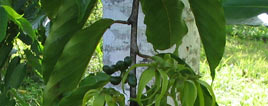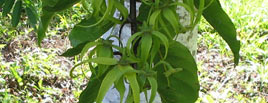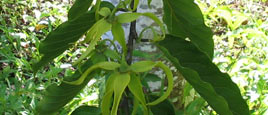|
||||
|
||||
Essential
oils have been used for thousands of years, not only in aromatherapy
but also in perfumes, pharmaceuticals and food flavoring. Aroma
therapists have said it takes just a tiny drop of ylang-ylang
oil rubbed into the chest and the user is carried away on the
wings of the scent. Its therapeutic effects are recommended for
anxiety, depression, insomnia, frigidity, treating high blood
pressure and skin conditions.
At Dem Dats Doin about a half dozen trees are growing throughout the property. The first two trees were planted from seeds in 1984; 18 months later it blossomed into a profusion of fragrant greenish yellow flowers. The trees are still producing flowers and berries. They are a source of food for birds (at least 15 species) consume the pulp surrounding the seeds. The leaves are harvested and carried by "wee-wee" (leaf cutter) ants to their underground gardens. The flowers are used in a distillation process to extract the oil. While in other countries the wood is used for making dugouts, drums, carvings, rope, medicine and tea chests in Ceylon. The seeds are a source of income for Dem Dats Doin as we export thousands of seeds annually. There are three basic methods of separating oils from plants and plant products - distillation, expression and extraction by volatile solvents, liquid fats and solid fats. At Dem Dats Doin we use the extraction by liquid fats method. However, through trial and error we have modified and applied "appropriate technology" to the process. The extraction process begins with the harvesting of mature chartreuse/yellow flower petals, rinsed to remove debris and/or insects, sun dried to remove moisture. These petals are packed into a glass container/flask in which 3-4 tablespoons of melted lard or animal fat are added. A rubber stopper is used to seal the flask. The viscous lard is allowed to percolate through the petals and thus impregnate the lard with its fragrance. The container/flask is turned over to further saturate the lard. This is done several times in direct sunlight to ensure the fragrance is totally removed from the petals. The question now - is how to remove the fragrance from the lard although at this point you can use it as pomade. The distillation process begins with the addition of one fluid ounce of 100% proof rum or vodka to the saturated melted lard. Then shake the mixture vigorously for about three minutes. Replace the rubber stopper with one that has a coiled copper tubing condenser. The short end of the coil goes through the stopper extending about an inch into the container. The other end of the coil is placed into a vial/container. Place the container unit in a small pan with about a ½" of water which is set on a stove burner. Heat the water in the pan to simmer (low flame). In a few minutes you will notice drops of clear liquid dripping into the vial. This is the concentrated finished perfume. Continue the process until the vial/container is filled. You will only extract the same amount that was added to the mixture. See diagram. The distilled perfume can be used in its concentrated form. However, it should be tightly sealed to prevent oxidation. Due to alcohol's volatile nature, a substance known as a fixative must be added to the scented liquid in order to retard oxidation. Natural fixatives are musk, ambergris, cedar, sandalwood and skunk oils. These fixatives are imports and prohibitively expensive. At Dem Dats Doin we add a few drops of 'cohune oil' to the vial container and shake vigorously for about 5 minutes. Visitors to Dem Dats Doin have the opportunity to smell the natural flowers when in season and the perfume. At Dem Dats Doin the flower petals are placed between sheets and towels to keep them smelling fresh. The flower petals scent is stronger as it dries. We also have plants in our nursery for sale demdatsdoin@btl.net |
||||||||||
|
||||||||||













